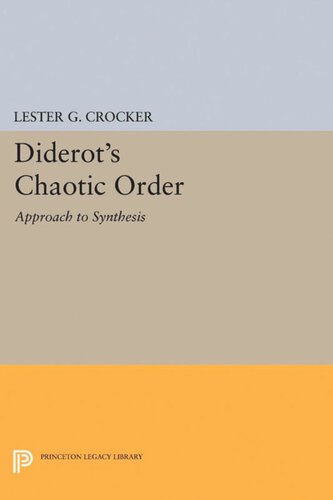

Most ebook files are in PDF format, so you can easily read them using various software such as Foxit Reader or directly on the Google Chrome browser.
Some ebook files are released by publishers in other formats such as .awz, .mobi, .epub, .fb2, etc. You may need to install specific software to read these formats on mobile/PC, such as Calibre.
Please read the tutorial at this link: https://ebookbell.com/faq
We offer FREE conversion to the popular formats you request; however, this may take some time. Therefore, right after payment, please email us, and we will try to provide the service as quickly as possible.
For some exceptional file formats or broken links (if any), please refrain from opening any disputes. Instead, email us first, and we will try to assist within a maximum of 6 hours.
EbookBell Team

4.1
60 reviewsBecause of its fragmentary, evolving, exploratory, and dialectical character, Diderot's thought has continuously resisted overall synthesis. In the ideas of "order" and "disorder," ideas important in all of eighteenth-century thought, Lester G. Crocker finds the key to an outline of a structure that leads to a genuine synthesis of Diderot's writings on philosophy, morality, politics, and aesthetics.
The tensions in Diderot's thought, Professor Crocker shows, reflect his understanding of reality itself—paradoxically, an anarchic order, a dynamic universe governed by laws but always changing in a chaotic way.
The book examines Diderot's approach to aesthetics as a human ordering response to the world, and his approach to morals and politics as practical ways of dealing with the problems of order and disorder in the context of life in society. In light of the concepts of order and disorder, the inextricable associations of all of these realms of thought in Diderot's work become clear, and a unity is perceived.
Since the problem of order and disorder was fundamental to an age faced with the dissolution of the Christian view of cosmic order, this novel approach to Diderot's work suggests new ways of understanding the Enlightenment as a whole.
Originally published in 1974.
The Princeton Legacy Library uses the latest print-on-demand technology to again make available previously out-of-print books from the distinguished backlist of Princeton University Press. These editions preserve the original texts of these important books while presenting them in durable paperback and hardcover editions. The goal of the Princeton Legacy Library is to vastly increase access to the rich scholarly heritage found in the thousands of books published by Princeton University Press since its founding in 1905.